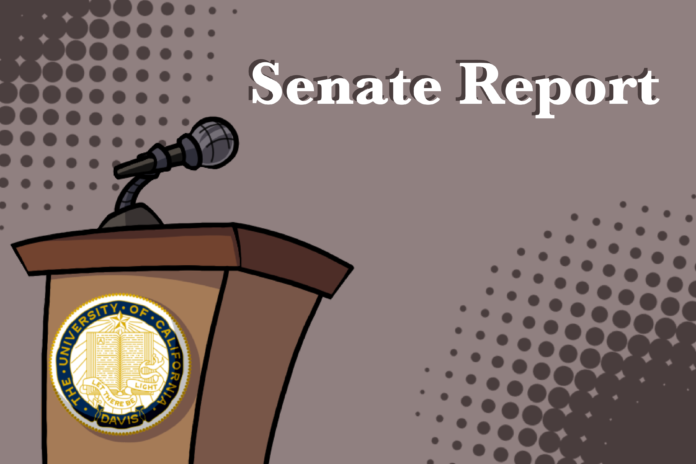Students impacted by UCPath failure may receive monetary compensation
The Feb. 26 Senate meeting was called to order at 6:12 p.m by ASUCD Vice President Shreya Deshpande who began the meeting by congratulating the table on the association’s recently-passed Basic Needs and Services Referendum.
“We quite literally saved the association with the referendum passing,” President Justin Hurst said.
Hurst also congratulated the table on the election’s successful turnout — the largest turnout in ASUCD history, with around 30% of undergraduate students voting. In the past, ASUCD elections have resulted in student turnouts as low as 4%.
The majority of the meeting focused on an open discussion between members of the Senate table and Chancellor Gary May. Several UC Davis vice-provosts were also in attendance.
May said he expected students to have questions about both coronavirus and COLA activity.
Elena DeNecochea, Gender and Sexuality Commission chair, addressed UC Davis’ controversial partnership with Dignity Health, a Catholic Hospital chain. Dignity has a history of restricting health care services based on religious beliefs. A recent report published by a UC working group assessing UC Davis’ existing partnerships said Dignity’s “disengagement is de facto discrimination against the poor, and especially against women and children of color.”
The report also stated that Dignity adheres to “ethical and religious directives for the Catholic health care services” that exclude reproductive health care and care for LGBT+ communities.
“The partnership with Dignity Health is a clear slap in the face to the work that we do and the values we believe in, that our LGBTQIA students are humans and they have rights,” DeNocochea said.
“I think our true objective should be to serve as many needy patients that we can, with the caveat that if we have a partnership, they need to abide by our principles and if that can’t happen, we shouldn’t have that partnership,” May said.
May acknowledged that he is not in the position to make a decision on UC Davis’ partnership with Dignity Health and that the issue is being referred to the UC Regents. He said he will address the issue with the Regents.
DeNecochea also asked about the university’s ongoing actions in response to the flawed implementation of UC Path.
“A lot of us want to see a lawsuit, we want to see compensation,” DeNecochea said. “It’s not legal to go months without pay for work.”
May acknowledged issues with the implementation of UCPath during Fall Quarter.
“Any time you implement a large software system there are going to be glitches,” May said. “We have owned the mistakes that we’ve made and tried to resolve those.”
One UCPath glitch caused more than 800 faculty, staff and undergraduate employees to experience paycheck issues during Fall Quarter. Many went unpaid for more than one pay period and others experienced incorrect payment amounts.
With other UC campuses that had already implemented UCPath experiencing similar issues, it seems that UC Davis had an opportunity to address the system’s shortcomings before implementation here.
According to May, there are still 15 to 20 existing issues with student pay as a result of students starting work before they have been properly on-boarded. May also said there have been no residual paycheck issues during Winter Quarter.
According to May, UC Davis leaders are currently engaged in discussions working to put forth a proposal that may offer additional monetary compensation for affected employees. May did not disclose when students would expect to see this proposal.
Jonina Balabis, the chair of the Ethic Cultural Affairs Commission, then addressed coronavirus outbreaks and racism toward Asian and international students on campus.
“What steps is the university taking to really be there for its students?” Balabis asked. “International students, in particular, often feel already alienated by the college administration.”
Balabis said international students and Asian students have been targets for racist insults and bullying as a result of the coronavirus outbreak.
“For specific incidents of racism or bias, we hope you will file a complaint,” May responded.
May also cited his online posts calling for students to invoke the Principles of Community as a tangible step the university has taken to minimize incidents of racism in response to the coronavirus outbreak.
When asked if any campus bodies have reached out to international students in response to racism stoked by coronavirus, May said leadership has not reached out in any way.
Discussion then moved to address recent COLA strikes at UC Santa Cruz and across other UC campuses.
May acknowledged the legitimacy of graduate students’ frustration.
“Everyone recognizes the housing crisis in California,” May said. “We would be foolish to ignore that or suggest the situation is optimal for our students.”
At the same time, May said graduate students’ demands would cost the university hundreds of thousands of dollars that, according to him, the university does not have access to.
May has met with graduate students groups on campus twice in the last week and said he is willing to meet with leaders going forward. May also suggested that despite the validity of graduate students’ demands, breaking a union contract could set a dangerous precedent going forward.
Written by: Ally Russell — campus@theaggie.org









